Ecotourism Market Overview, 2035
The global ecotourism market size was valued at $210.4 billion in 2023, and is projected to reach $829.8 billion by 2035, growing at a CAGR of 11.7% from 2024 to 2035. The global ecotourism market demand is driven by factors such as unique destinations gaining popularity among tourists and rise of social media positively impacting travel industry. However, inadequate support infrastructure and sustainability challenges restrict ecotourism market growth. On the contrary, an increase in public private partnership is expected to offer new opportunities in the coming years.
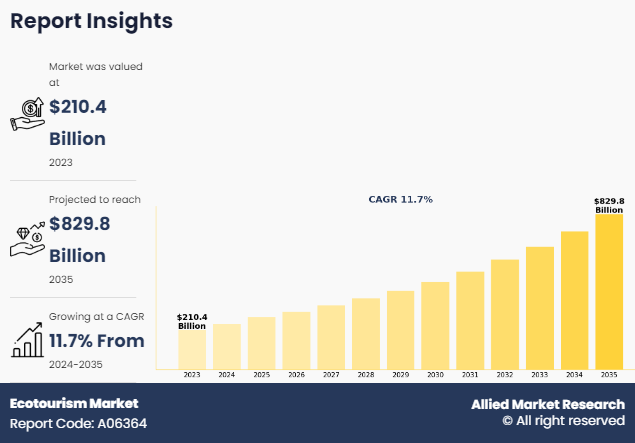
Ecotourism is a responsible approach to travel that emphasizes environmental preservation, community participation, and cultural knowledge. It entails visiting natural regions to enjoy, monitor, and acquire knowledge regarding the regional flora and fauna while minimizing unwanted consequences. Ecotourism promotes conservation efforts by providing economic advantages to local communities, financing environmental protection programs, and increasing awareness about the need for biodiversity preservation. The key concepts of ecotourism include reducing carbon impact, supporting community enterprises and communities, honoring indigenous traditions, and engaging in appropriate wildlife-watching techniques. Ecotourism promotes environmental stewardship and contributes to a brighter future for both individuals as well as the earth by establishing a stronger bond between visitors and nature.
Key Takeaways
By traveler type, the group traveler segment led in terms of ecotourism market size, in 2023; however, the solo traveler segment is expected to gain market share in the upcoming years.
By age group, the Generation Y segment accounted for more than half market share of the ecotourism industry in 2023; however, the Generation Z is projected to grow at the highest CAGR during the forecast period.
By sales channel, the travel agent segment is expected to gain market share in the upcoming years and is estimated to grow at a CAGR of 11.9% during the forecast period.
By region, North America region is anticipated to grow with robust CAGR of 12.3% during the forecast period.
Market Dynamics
In the face of troubling scientific certitude and stands about the unsustainable state of environment, an increased number of engaged stakeholders in the industry are focusing on sustainability over the past few years. Leading stakeholders in the industry are spending significant time and resources to create eco-friendly accommodation even in the face of high short-term development costs and attenuated return on investments (ROI). Front runners in the tourism industry are successfully finding new opportunities in social and environmental issues to create new business models, corporate strategies, and collaborative partnerships. These changes in landscape are backed by alterations in the consumer behavior. Almost three-fourths of the travelers prefer sustainable stay and almost 80% travelers are intending to stay at least once in an eco-friendly or green accommodation; however, travelers often face common barriers such as extra expenditure, underdeveloped locations with weak infrastructure, and lack of information. Thus, mutually beneficial partnership between travel agency and engaged stakeholders play a crucial role in integrating a better and seamless consumer experience in the upcoming years.
Nowadays, technology has become a basic prerequisite to ensure multiple operations are carried out immaculately, and the tourism industry is no different. Technology has always been a supporting factor for the travel and hospitality industry. Technology is disrupting the established market with the advent of web-based booking and use of AI and IoT in operation optimizations. Technology-driven players such as online hotel aggregators and metasearch engines, have heavily invested on big data analytics to make analytics-driven business decisions. Furthermore, use of Artificial Intelligence has been deployed in chatbots and virtual assistants to provide seamless customer experience. In addition, key players in the industry are driving their attention toward enhancement of mobile experience to provide a more user-friendly experience to the travelers while booking on their platforms.
Tourism with sustainability and minimal impact on environment is another major hurdle that the stakeholders face in the ecotourism market. Some of the major environmental impacts with direct implications to natural habitats and ecosystem include noise pollution, overcrowding, garbage pollution, fire hazard, introduction of non-native species along with sewage outflow, to name a few. Ecotourism involves taking travelers to ecosystems relatively untouched by humans. Introduction of any foreign element to these delicate ecosystems disrupts natural processes. For instance, the presence of humans can scare off prey resulting in disruption of hunting patterns for predators. In addition, a very high number of tourists can lead to habitat loss and soil erosion and additional stress on the environment to accommodate more people.
The growth of the ecotourism business confronts considerable obstacles due to insufficient infrastructure for support in numerous regions. Insufficient transportation networks, such as roads, airports, and public transportation, might impede access to isolated ecotourism locations, discouraging potential tourists. In addition, limited housing alternatives, such as eco-lodges and ecological campsites, are limiting the number of tourists who can stay in these locations. Moreover, insufficient waste management and sanitation services are causing environmental deterioration and health issues, reducing the attraction of ecotourism areas. Furthermore, an absence of professional guides and interpreters who are capable of providing extensive knowledge about local ecosystems and fauna reduces the educational component of ecotourism trips. To fix these infrastructure difficulties, governments, local communities, and private sector partners must work together to invest in long-term infrastructure development that promotes ecotourism while reducing environmental damage and safeguarding cultural heritage.
The past decades have seen increasing interest and demand for sustainable tourism. As a result, the paradigm shift in consumer behavior has resulted in increased focus on sustainability; thus, driving changes in both tourism promotion and marketing along with product development. Public-private partnerships in the form of subsidizing air routes to remote tourist destinations, improving transport capabilities, and ease of access will result in market expansion, thereby providing lucrative opportunities for the local stakeholders.
There are various instances where the government is partnering with the private players for improving fortunes of the destinations. For instance, Chumbe Island in Tanzania was experiencing destruction of the natural ecosystem and deteriorating health of coral reefs owing to unsustainable fishing techniques. The government ventured into public-private partnership granting environmental NGO long‐term concessions to the islands and banned fishing in the reef area.
The environment NGO hired displaced fishermen for patrolling the coral reef along with providing environmental awareness training to local villages. Subsequently, the NGO along with the fishermen and villagers started restoring the island native ecosystem, and built environment‐friendly accommodations for the visitor on the island, thus resulting in significant strengthening of local ecosystem. Such partnerships can shape the global ecotourism market in an enhanced and sustainable manner.
Segments Overview
The ecotourism market is segmented into traveler type, age group, sales channel, and region. Depending on the traveler type, the ecotourism market is segregated into solo and group. On the basis of age group, it is fragmented into Generation X, Generation Y, and Generation Z. By sales channel, the ecotourism market is segmented into travel agents and direct. Region wise, it is analyzed across North America (the U.S., Canada, and Mexico), Europe (Germany, UK, France, Italy, Spain, and Rest of Europe), Asia-Pacific (China, Japan, India, Australia, Malaysia, Thailand, Indonesia, and Rest of Asia-Pacific), and LAMEA (Saudi Arabia, UAE, Brazil, Argentina, South Africa, and Rest of LAMEA).
By Traveler Type
According to the ecotourism market statistics, on the basis of traveler type, the group segment dominated the ecotourism industry in 2023 and is expected to continue this trend during the forecast period. Tourists prefer travelling in groups owing to security concerns at new and unexplored destinations. Furthermore, low expenses while travelling in a group lures tourists to opt for the same. In addition, shared interest and experience assists in bonding people together very quickly. Group traveling is hassle free, provides sense of security, and is much more economical when compared to other counterparts.
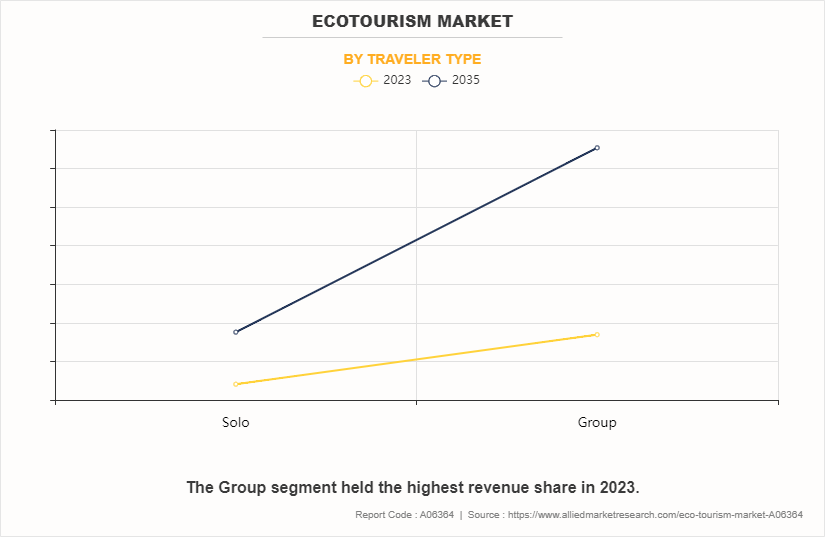
By Age Group
Depending on age group, the Generation Y segment led the ecotourism market in 2023 and is expected to maintain this trend during the forecast period. Generation Y are avid travelers comprising large number of people traveling worldwide. Generation Y tends to travel in groups, however, solo travelling to remote destinations is trending amongst millennials. Furthermore, they generally look for cultural and leisure breaks. Millennials are driven by wanderlust and breaking life’s monotony; these group of youngsters prefer short trips to countries having naturally rich heritage.
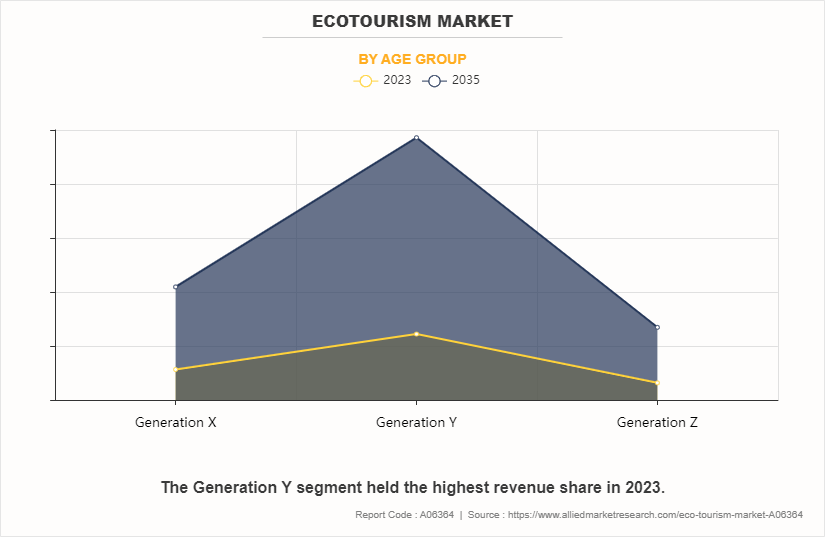
By Sales Channel
Depending on sales channel, the travel agent segment led the ecotourism market in 2023 and is expected to maintain this trend during the ecotourism market forecast period. Travel agents are the front runners for devising customized tours. These operators are experienced consultants, who have deep knowledge for a particular region, and hence, offer first-hand experience and recommendations for designing tailor made tours. These operators also work very closely with a local agent in the destination country. The increase in trend of tailor-made tours have resulted in increased demand for tour operators and agencies in recent years.
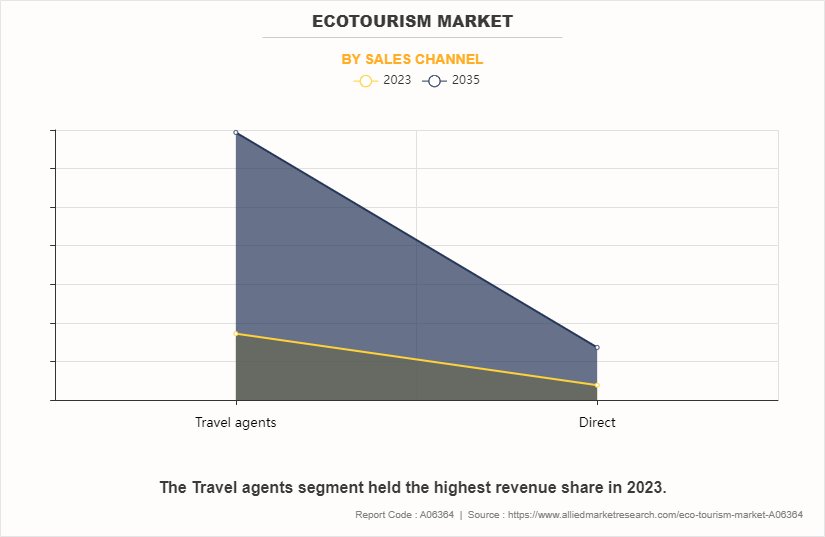
By Region
Region wise, Asia-Pacific dominated the ecotourism market in 2023 and is expected to dominate the market during the forecast period. Asia-Pacific has been known for its diverse culture and attractive destinations. China, Japan, Australia, and India have the highest outbound trip concentration among the higher household income brackets. Based on the household income, households earning above $10,000 account for more than 73% of all outbound travel. This can be attributed to the rapidly growing economy and new job opportunities promoting an increase in household income in the Asia-Pacific region.
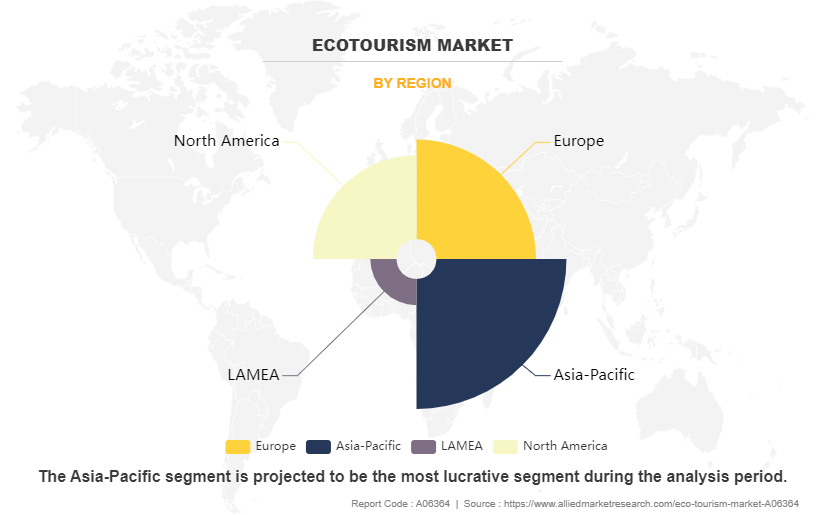
Competitive Analysis
Players operating in the ecotourism market have adopted various developmental strategies to expand their ecotourism market share, increase profitability, and remain competitive in the market. The key players profiled in this report include Travel Leaders Group, LLC, Aracari Travel, FROSCH International Travel, Inc., Undiscovered Mountains Ltd, Adventure Alternative, Intrepid Group Limited, RICKSHAW TRAVEL GROUP, G Adventures, Steppes Discovery, and Small World Journeys Pty Ltd.
Key Benefits For Stakeholders
- This report provides a quantitative analysis of the market segments, current trends, estimations, and dynamics of the ecotourism market analysis from 2023 to 2035 to identify the prevailing ecotourism market opportunities.
- The ecotourism market research is offered along with information related to key drivers, restraints, and opportunities.
- Porter's five forces analysis highlights the potency of buyers and suppliers to enable stakeholders make profit-oriented business decisions and strengthen their supplier-buyer network.
- In-depth analysis of the ecotourism market segmentation assists to determine the prevailing market opportunities.
- Major countries in each region are mapped according to their revenue contribution to the global ecotourism market.
- Ecotourism market player positioning facilitates benchmarking and provides a clear understanding of the present position of the market players.
- The report includes the analysis of the regional as well as global ecotourism market trends, key players, market segments, application areas, and market growth strategies.
Ecotourism Market Report Highlights
| Aspects | Details |
| Forecast period | 2023 - 2035 |
| Report Pages | 230 |
| By Age group |
|
| By Traveler type |
|
| By Sales channel |
|
| By Region |
|
| Key Market Players | RICKSHAW TRAVEL GROUP, ADVENTURE ALTERNATIVE LTD, ARCARI TRAVEL, STEPPES TRAVEL LTD, UNDISCOVERED MOUNTAINS LTD, G ADVENTURES, FROSCH INTERNATIONAL TRAVEL, INC, TRAVEL LEADERS GROUP, LLC, SMALL WORLD JOURNEYS PTY LTD, INTREPID GROUP LIMITED |
Analyst Review
According to the CXOs, travelers nowadays are opting for unique and exotic holiday destinations to get away from the daily hectic schedule and gain valuable experiences. Pristine, quiet, serene, and exotic locations are the major factors that people consider while choosing their travel location. As a result, natural and unadulterated destinations are gaining high traction among travelers, especially among millennials.
The growing tourism industry is exerting high pressure on natural resources. As a result, focus on maintaining environmental integrity and developing tourism in an ecologically sustainable manner remains a priority for the engaged stakeholders.
Various initiatives by governments for facilitating tourist access and improving the destination experience are in place to promote and expand ecotourism. Public-Private Partnerships (PPPs) can be an effective tool for tourism product enhancement and development, along with research, promotion, and marketing. From social collaboration to major infrastructure and development projects, public-private partnership can play a vital role in transforming ecotourism.
The Ecotourism market was valued at $210.4 billion in 2023 and is projected to reach $829.8 billion by 2035, registering a CAGR of 11.7% from 2024 to 2035.
The Ecotourism market registered a CAGR of 11.7% from 2024 to 2035.
Raise the query and paste the link to the specific report and our sales executive will revert with the sample.
The forecast period in the Ecotourism market report is from 2024 to 2035.
The top companies that hold the market share in the Ecotourism market include Travel Leaders Group, LLC, Aracari Travel, FROSCH International Travel, Inc., and Undiscovered Mountains Ltd
The Ecotourism market report covers segmentation based on traveler type, age group, and sales channel.
Region wise, Asia-Pacific is estimated to register the highest CAGR of 11.9% from 2024 to 2035.
Loading Table Of Content...
Loading Research Methodology...



